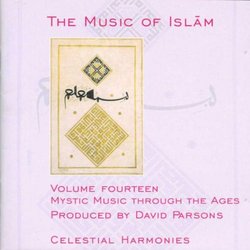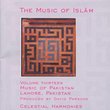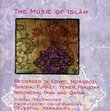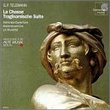| All Artists: Various Artists Title: The Music of Islam, Volume 14: Mystic Music Through the Ages Members Wishing: 0 Total Copies: 0 Label: Celestial Harmonies Release Date: 10/7/1997 Genres: International Music, Pop Styles: Middle East, Turkey, Islamic Number of Discs: 1 SwapaCD Credits: 1 UPC: 013711315424 |
Search - Various Artists :: The Music of Islam, Volume 14: Mystic Music Through the Ages
 | Various Artists The Music of Islam, Volume 14: Mystic Music Through the Ages Genres: International Music, Pop
Ten years in the making, The Music of Islam series recorded in Egypt, Morocco, Tunisia, Turkey, Yemen, Pakistan, Indonesia, Iran and Qatar represents the most comprehensive sound documentation available to Westerners to... more » |
Larger Image |
CD DetailsSynopsis
Album Description Ten years in the making, The Music of Islam series recorded in Egypt, Morocco, Tunisia, Turkey, Yemen, Pakistan, Indonesia, Iran and Qatar represents the most comprehensive sound documentation available to Westerners today, of a world religion dating back to 1/622. Although governed by strict rules for fourteen centuries, contact with other cultures has radically affected Islamic music throughout history. As the world enters the XV/21st century the timing of this collection serves an even larger purpose, documenting the traditions that have survived and will continue to survive for centuries to come. Today, one fifth of the world's population, one billion people, are Muslims, occupying a large territory stretching from the Atlantic shore of north and west Africa, through west, central, and south Asia to island southeast Asia, and attracting an increasing following in India, western Europe, north America, east Asia, and southern Africa. This is a global presence which cannot be ignored.This volume focuses on the mystic music of the Islamic world - specifically Turkish mystics. To Westerners, Islamic mysticism is practically synonymous with Sufism. Sufi poetry and music have endured for centuries in various Islamic countries. In the mystical brotherhoods music always had a revered and acknowledged place. Although the term music is never used in mystical writings, but rather listening - voice, gesture and musical instruments are all aids to the devotee in his spiritual exercise, which leads him to ecstasy and to supreme union with God. In every case, the music draws its inspiration from the text, and its structure from a sophisticated set of modes, rhythms, and traditional forms.The tracks on this recording literally date from the V-XIV/11th-20th centuries featuring many famous compositions such as Tekbir and Salavat-i Serife, known throughout the Islamic world as two of the masterworks of one of Turkey's greatest composers. Also featured are ilahis (hymns), excerpts of the sema ritual and dhikr (zikr in Turkey) ceremonies. Completing the volume is a vocal performance of Surah 19, Ayet 115-117 of the Qur'an. Similar CDsSimilarly Requested CDs
|
CD ReviewsExquisite simplicity and piety Alejandra Vernon | Long Beach, California | 01/09/2003 (5 out of 5 stars) "This collection of Sufi music is superb; as the liner notes explain, Turkish music reflects the history of its relationship with Central Asia, and also the influence of Persian classical form with its elegance and purity, a combination which perhaps to the Western ear might sound extremely foreign.
I find this fourteenth CD of the magnificent "Music of Islam" series to be soul-stirring and uplifting. If you enjoy this type of music, it is an ideal recording to minimize the din and sensory overload of the 21st century world.These mystic Sufi hymns are sung with much beauty and piety, and with the backing of classical art music instruments, which are: The nay (oblique flute), with its whispery sound, the tanbur (a long-necked lute), the qanun (a type of zither), the kamanche (fiddle), and kundum (drums).Some of the songs use the poetry of the great Rumi, and others chant the holy names of God; of my very favorites, track 8 is a liturgical piece by Rumi used to begin religious celebrations, and the final track is a recitation that is a fitting ending for this exquisite CD. To quote the liner notes: "The concluding prayer is chanted in a way that blurs the distinction between speech and song", and it is from the Qur'an: "East or West, it all belongs to God; wherever you turn God is there".The musicians are from the Galata Mevlevi Music and Sema Ensemble who are based in Turkey, where this recording was made. The presentation on all 16 CDs (including the sampler) of this Celestial Harmonies series is exceptional. This one has a 48 page booklet with extensive history, detailed explanation of each musical piece, recording info, and more. Total time is 63'56." |

 Track Listings (18) - Disc #1
Track Listings (18) - Disc #1









